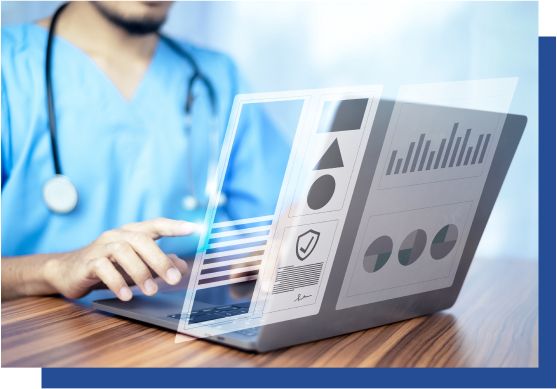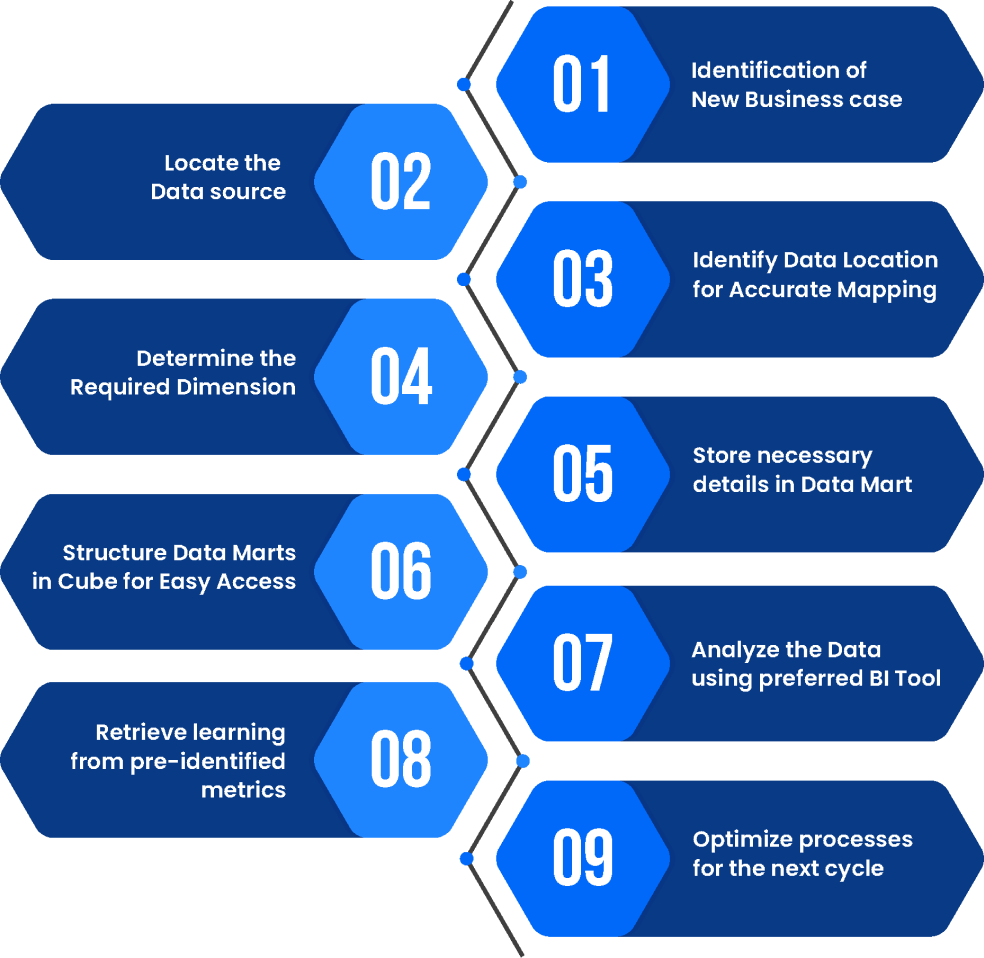Healthcare data analytics services refer to specialized solutions that leverage advanced data analysis techniques to extract valuable insights from vast healthcare datasets and provide insights for informed decision-making.
Healthcare Data Analytics Implementation Challenges
These challenges can hinder you from revamping your business

Data Quality
Hospitals collect a vast amount of data from various sources and ensuring that the data is accurate and reliable can be challenging. The quality of the data has a direct impact on the accuracy of the insights. It's crucial to have proper data management and data segregation before implementing analytics.

Data Security
With sensitive patient data involved, it's crucial to ensure that the data is secure from unauthorized access or cyber threats. Hospitals need to implement robust security measures to protect the data from any breaches or attacks.

Integration of Data
Hospitals use multiple systems and applications to collect data, and integrating these systems can be challenging. Most provider networks don’t have a centralized system to store data. This makes implementing analytics difficult and also risky.

Staffing and Expertise
Data analytics requires skilled professionals who understand technology, data management, and analytics techniques. Hospitals need to invest in training their staff or hiring specialized personnel to manage the data analytics process. This process is time-consuming and is not worth for provider organizations.
Healthcare Analytic services that we offer
Here are the 3 different kinds of analytics solutions we offer for US health organisations
- Analyze your company workflows and provide detailed information on how you can benefit from data analytics.
- Figure out the Healthcare data analytics strategy that fits you.
- Trace down the road map for a successful data analytics solution implementation.
- Providing advisory support during the planning, execution, and evolution phases of a healthcare analytics project.
- Selecting the data analytics platform and tech stack based on your needs.
- Developing the healthcare data analytics solution with customizations based on your requirements.
- Performing mandatory compliance checks to make sure that our solution is up to date with healthcare industry standards.
- Predicting how your business is going to evolve and mapping out the upgrades and maintenance accordingly.
- Providing security and compliance updates to your existing solution.
- Building healthcare analytics modules to compliment your existing applications
- Providing technological upgrades for your existing healthcare analytics solutions
- Overhauling UI & UX upgrades of your existing solution.

Data without analytics is equivalent to trash!
Let us HelpHealthcare Data Analytic Solutions
These are the 5 different types of solutions that you get from our healthcare data analytics platform
Types of Data Analytics for Healthcare
These are the 5 major types of analytics that we offer

Diagnostic Analytics
Analytics that are used to identify the root causes of problems or issues in healthcare systems are known as diagnostic analytics. It helps healthcare providers identify and optimize clinical workflows and reduce inefficiencies.

Prescriptive Analytics
This is used to recommend specific actions based on predictive analytics insights. Prescriptive analytics can help healthcare providers optimize treatment plans, reduce readmissions, and improve patient outcomes.

Descriptive Analytics
This kind of analytics is applied to examine historical data and offer perceptions into the past. Providers can use descriptive analytics to better recognize patterns in patient data, including demographics, clinical results, and treatment trends.

Predictive Analytics
This type of analytics is used to predict future outcomes based on historical data. Predictive analytics can help healthcare providers anticipate patient health risks, identify patients who are at risk for readmission, and optimize treatment plans for individual patients.

Real-time Analytics
These analytics are used to provide insights in real-time. Real-time analytics can help healthcare providers monitor patient health in real-time, identify potential complications, and provide timely interventions to improve patient outcomes.
Is your data still collecting dust in different silos?
We can turn them into actionable insights.
Let us Help
Advantages
Here is a glimpse of the merit's providers and payers get to experience with the power of healthcare data analytics

Minimize Quantity of Care: By analyzing data, providers can identify potential areas where quality of care may be lacking and take actions before they become bigger problems.

Upgrade Quality of Care: Helps healthcare providers identify areas where they can improve the quality of care they offer to patients, such as reducing wait times or improving patient outcomes.

Reduced Cost-of-Care: Data analytics can help healthcare organizations identify inefficiencies and streamline processes to reduce the overall cost of care while maintaining quality.

Better Provider Negotiations: By analyzing data on healthcare utilization, providers can negotiate better rates with insurers and reduce the cost of care for patients.

Predictive Maintenance: It can help healthcare providers and payers identify equipment that is likely to fail and perform maintenance before it becomes a problem.

Improved ROI on Campaigns: Analytics can help develop targeted marketing campaigns that are more likely to resonate with their audience and deliver a higher return on investment.


Proactive Healthcare: By analyzing data on patient populations, providers can identify patients who may be at risk for certain conditions and proactively offer preventative care.

Retaining Customer Loyalty: By using data analytics to personalize and improve the patient experience, healthcare providers can increase patient satisfaction and retain customer loyalty.
Why Nalashaa
With the right partner, health plans can measure, manage and optimize their offerings, all the while maintaining their ongoing business operations.

Command over data management tools and best practices

Experience with handling healthcare payer systems

Adherence to latest compliance in execution
Utilize Your Data Effectively
Utilize Your
Data Effectively
Unlock your Healthcare Data Today, for a better tomorrow. Align and manage your systems to ensure a holistic healthcare journey.
You Need Data Analytics Solutions For
- Historical Member Data
- Historical Care Outcomes
- Lifestyle Monitoring
- Historical Claims Data
- Out-of-Network Claims
- Claim Denial Reasons
- Member Enrollment Patterns
- System Performance
- Predict Diseases
- Member Education
- Optimize Medication Reminders
- Proactive Care
- Optimize Claim Clearance
- Proactive Provider Suggestion
- Predict Fraudulent Claims
- Preventive Maintenance
- Churn Rate
- Prior Authorization Metrics
- Care Program Adherence
- Unattended/unsatisfactory calls
- Enrollment Bottlenecks
- Member Support Services
- Social Determinants
- Improve Net Promoter Score
- Manage High-risk Patients
- Optimize Reminder Delivery
- Improve action Rate
- Optimize Enrollment
- Reduce Member Attrition
- Provider Engagement Activities
- Out-of-network and In-network Claims
- Care Outcomes and Quality of Care
- Provider Performance
- Cost of Treatments
- Population Health Programs
- Optimize Contract Negotiations
- Encourage Improved Performance
- Streamlined On-boarding Process
- Improve Provider Retention
- Reduce Care Gap
- Member Feedback
- Member Engagement Behavior
- Firmographic Data
- Social Determinants
- Target Audience Segmentation
- Cost of Communication/Channel
- Optimize Digital Marketing
- Optimize Marketing Channels
- Improve Member Retention
- Optimize Member Engagement
- Personalized Marketing
- Optimize ROI on Campaigns
You Need Data Analytics Solutions For
Analyze
- Historical Member Data
- Historical Care Outcomes
- Lifestyle Monitoring
- Historical Claims Data
- Out-of-Network Claims
- Claim Denial Reasons
- Member Enrollment Patterns
- System Performance
End Restults
- Predict Diseases
- Member Education
- Optimize Medication Reminders
- Proactive Care
- Optimize Claim Clearance
- Proactive Provider Suggestion
- Predict Fraudulent Claims
- Preventive Maintenance
Analyze
- Churn Rate
- Prior Authorization Metrics
- Care Program Adherence
- Unattended/unsatisfactory calls
- Enrollment Bottlenecks
- Member Support Services
- Social Determinants
End Restults
- Improve Net Promoter Score
- Manage High-risk Patients
- Optimize Reminder Delivery
- Improve action Rate
- Optimize Enrollment
- Reduce Member Attrition
Analyze
- Provider Engagement Activities
- Out-of-network and In-network Claims
- Care Outcomes and Quality of Care
- Provider Performance
- Cost of Treatments
- Population Health Programs
End Restults
- Optimize Contract Negotiations
- Encourage Improved Performance
- Streamlined On-boarding Process
- Improve Provider Retention
- Reduce Care Gap
Analyze
- Member Feedback
- Member Engagement Behavior
- Firmographic Data
- Social Determinants
- Target Audience Segmentation
- Cost of Communication/Channel
End Restults
- Optimize Digital Marketing
- Optimize Marketing Channels
- Improve Member Retention
- Optimize Member Engagement
- Personalized Marketing
- Optimize ROI on Campaigns
Your Path to Data Maturity

Frequently Asked Questions
1. What type of data analytics is used in healthcare?
Healthcare professionals use a variety of data analytics techniques to analyze and improve patient outcomes, operational efficiency, and cost-effectiveness. These include descriptive analytics to summarize past events, diagnostic analytics to identify problems and their causes, predictive analytics to forecast future events, and prescriptive analytics to recommend actions to achieve desired outcomes. Healthcare data analytics also involves data mining, machine learning, and artificial intelligence to identify patterns, relationships, and insights that can inform decision-making and improve patient care.
2. What is healthcare data analytics?
Healthcare data analytics is the process of collecting, analyzing, and interpreting large sets of healthcare data to extract meaningful insights and support decision-making in the healthcare industry. It involves using various statistical, computational, and predictive techniques to identify patterns and trends in data, which can help improve patient outcomes, reduce costs, and enhance overall healthcare delivery.
3. How does the healthcare industry use data analytics?
The healthcare industry uses data analytics to improve patient outcomes, reduce costs, and optimize operations. It involves collecting and analyzing large amounts of data from various sources such as electronic health records, medical devices, and claims data to identify patterns, trends, and insights. This helps healthcare providers make more informed decisions, personalize treatments, predict disease outbreaks, and prevent medical errors.






